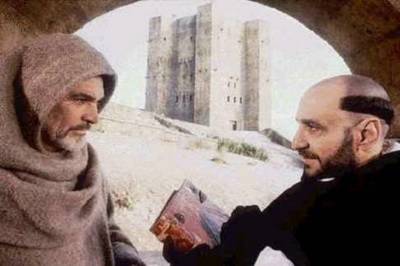Name of the Rose

A grimey middle ages setting infused with the investigative wit of Arthur Conan Doyle, The Name of the Rose is one unusual motion picture.
Franciscan Monk, William of Baskerville (Sean Connery dressed in drab grey, but acting in a glib Highlander-esque mode), comes to a monestary for a spirited religious debate on whether or not Jesus, owned property. (The Franciscan stance is that the Church shouldn't be owning wealth) with his young pupil (a pubescent pre-Heathers Christian Slater). Minutes after his arrival he discovers that there has been a recent murder on the holy grounds and the head of the order suspects supernatural (Could it be...Satan?) causes. You see, the monk was found dead of a fall below a window high in the top tower that was sealed shut and remains so. As William investigates in a pragmatic and rational fashion using deductive reasoning, the monks go the other way, whipping themselves into a paranoid fervor. When the inquisitors arrive, led by a diabolical F. Murray Abraham, things get even worse, with several of the locals up for burning at the stake.
The Name of the Rose is superb on both a storytelling and atmospheric level. The central themes dealing with the power of knowledge--and fear of any forward-progress, the passion of enforced ignorance and self-censorship and the cruelties a religious order can dole out to the very people it is entrusted to protect make this a very adult motion picture.
The Abbey itself is a character, with it's dusty, twisted passages, dense kitchen, open courtyard with large stablery, and even a library labyinth full of secrets and puzzles (and only in a slightly Indiana Jones sort of way). The monks are chalk full of great european character actors, notably the underused Michael Lonsdale (Ronin) as the Abbot, as well as Ron Perlman (Hellboy) as an id-like monk and William Hickey (The Sentinal) as the prophetic doomsayer.
Fittingly, for a movie about repression and solemnity, it has one of the most passionate and feral sex scenes in film the 1980s, controversially between two teenagers. The final tie that binds the movie together, helpfully supplied by a more often than not gratuitous voice-over narration, is irrational lust/love masking a vituous sense of compassion with the slightest hint of condescension or superiority. An apt metaphor for the usual state of organized western religion over the course of the ages?
Aside: Since I've never read the Umberto Eco novel on which the films is based, I don't know how well the film catures the novel. But judged by its own merits, things do not appear 'watered down.'

0 Comments:
Post a Comment
<< Home